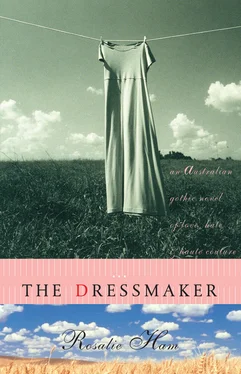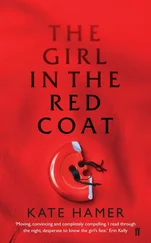Rosalie Ham - The Dressmaker
Здесь есть возможность читать онлайн «Rosalie Ham - The Dressmaker» весь текст электронной книги совершенно бесплатно (целиком полную версию без сокращений). В некоторых случаях можно слушать аудио, скачать через торрент в формате fb2 и присутствует краткое содержание. Год выпуска: 2000, ISBN: 2000, Издательство: Duffy & Snellgrove, Жанр: Историческая проза, Современная проза, на английском языке. Описание произведения, (предисловие) а так же отзывы посетителей доступны на портале библиотеки ЛибКат.
- Название:The Dressmaker
- Автор:
- Издательство:Duffy & Snellgrove
- Жанр:
- Год:2000
- ISBN:9781875989706
- Рейтинг книги:5 / 5. Голосов: 1
-
Избранное:Добавить в избранное
- Отзывы:
-
Ваша оценка:
- 100
- 1
- 2
- 3
- 4
- 5
The Dressmaker: краткое содержание, описание и аннотация
Предлагаем к чтению аннотацию, описание, краткое содержание или предисловие (зависит от того, что написал сам автор книги «The Dressmaker»). Если вы не нашли необходимую информацию о книге — напишите в комментариях, мы постараемся отыскать её.
The Dressmaker — читать онлайн бесплатно полную книгу (весь текст) целиком
Ниже представлен текст книги, разбитый по страницам. Система сохранения места последней прочитанной страницы, позволяет с удобством читать онлайн бесплатно книгу «The Dressmaker», без необходимости каждый раз заново искать на чём Вы остановились. Поставьте закладку, и сможете в любой момент перейти на страницу, на которой закончили чтение.
Интервал:
Закладка:
Sergeant Farrat said love was as strong as hate and that as much as they themselves could hate someone, they could also love an outcast. Teddy was an outcast until he proved himself an asset and he’d loved an outcast-– little Myrtle Dunnage. He loved her so much he asked her to marry him.
Sergeant Farrat walked now, back and forth in front of the mourners, speaking sternly, ‘He wanted you to love her, forgive her, and if she had been loved on that night … but of course you couldn’t love her, you are not as large as he in heart, nor will you ever be, and that is the sad fact. Teddy thought it unforgivable – so unforgivable that he was going to leave with Myrtle and you would have lost him. If you had included her, Teddy would have always been with us, instead of trying to prove the might of his love that night. He made a terrible mistake, and we need to forgive him for that mistake. He loved Tilly Dunnage as strongly as you hate her, please imagine that – she said that she would marry him and I know that without exception all of you, along with your secrets and mistakes and prejudices and flaws, would have been invited to witness the occasion. It would have been a soothing occasion, a right and true union. In fact, it was …’
A sound came from deep inside Mae. It was a sound only a mother can make.
Tilly heard all of this but it was as though she were watching through a motion picture camera. She saw that the coffin was white and covered by a mountain of wreaths and that there was row after row of neat backs shuddering and bunches of tearful faces turning away from her – the Almanacs crippled together, the Beaumonts all stiff and severe and held, fat Lois blotched and scabbed and blowing her nose, her big baby Bobby crying and Nancy and Ruth clutching him. Marigold sipped from a flask of something and there was Evan, red with anger but not looking at anyone. The footballers stood in a line with their backs rigid, holding their jaws high and tight, their eyes red and brimming.
Sergeant Farrat took Tilly home after the burial and Molly rose to sit in her chair by her daughter.
The wake was an awful affair that stayed soaked in stunned rage and wretchedness. Fred and Purl stood at the bar like orphans at a bus stop, since no one felt much like drinking and the sandwiches would not go down. The McSwineys sat as one, grey-faced and stiff and shocked in their chairs. Behind them on the wall hung photographs of their cheeky boy along with the Grand Final victory flag. The team said time and time again, ‘He won it single-handed for us,’ and tried to press the flag into Edward’s crossed arms.
• • •
Barney laboured up The Hill the next day with the galah on his shoulder, the cow at his heels and the chooks pecking along behind him. He tied the cow to the fence and put the galah on the post then stood in front of her with his hat crushed in his hands. He tried to raise his head to look at her, but he couldn’t get his eyes to meet hers.
She felt sick – bile rose in the back of her throat and her body ached from crying. She was exhausted, but her mind raced with venom and hate for herself and the people of Dungatar. She’d prayed to a God she didn’t believe in to come and take her away. She looked at Barney and wished he would hurt her, or embrace her, but he just pointed at the animals and said in a high, thin voice, ‘Dad said you’ll need ’em and they need a home.’ She stood unsteadily and held out a hand to him but his mouth screwed open and he turned and stumbled away, yowling, holding his arms across his chest. Tilly felt her heart turn and squeeze in her chest and she sat down heavily on the step, her face twisted and crying.
Graham stood harnessed and waiting, the cart behind him loaded with boxes and bundles and small brown and white dogs. Edward and Mae, Elizabeth, Margaret and Mary, Barney, George, Victoria, Charles, Henry, Mary, and Charlotte holding the baby, just stood close together, like sad rag dolls leaning each other upright. They watched the caravans and railway carriages burning. First there was smoke, then flames burst with a roar and a low wall of spitting red and orange rolled through the winter grass to the edge of the tip. The fire truck wailed from behind the shire offices and drove to park at the edge of the burning pyre. Some men got out of the truck and went to stand by the McSwiney family, then shook their heads and drove away.
When Edward was satisfied he’d rendered their happy family home a crumpled shrouded black heap, the family left. They followed Graham, the first rays of morning sun on their backs. They didn’t look back, just stumbled away slow and bent to find a new place to start, their faint moans to reach at her forever.
The afternoon grew bitterly cold but still she couldn’t go back inside. The place was full of material – coloured bolts and rags, loose threads and cotton reels, needles and frayed edges, mannequins shaped like snobby old Elsbeth and canvas water-bag Gertrude, and puny Mona or putrid gossiping Lois, leathery old sticky-beak Ruth, venomous Beula. The floor was a mattress of pins, like dead pine needles under a dark plantation. She lit another cigarette and drank the last watermelon fire-water from a bottle. Her face was puffy, her eyes purple and swollen from crying. Her hair stuck out in clumps about her shoulders like strands of aloe vera leaf, and her legs and feet were bruised with cold. Deathly pale and shuddering in the smoke rising from the tip, she stared down. The town was dormant, the eye closed.
She remembered Stewart Pettyman’s eyes staring up and the sound, crack , the groan then another sound like a cow falling on hay. When she opened her eyes Stewart Pettyman lay in the hot summer grass with his head all twisted to the side, very suddenly. There was a smell, and blood came from between his red, sloppy lips. Liquid poo filled his shorts and crept out under his thighs.
Sergeant Farrat said to her, ‘His neck is broken. He is dead now and gone to heaven.’
Tilly shifted her gaze to the square dark silo that sat like a giant coffin beside the railway line.
20
The people of Dungatar gravitated to each other. They shook their heads, held their jaws, sighed and talked in hateful tones. Sergeant Farrat moved amongst his flock, monitoring them, listening. They had salvaged nothing of his sermon, only their continuing hatred.
‘She made him jump.’
‘She murdered him.’
‘She is cursed.’
‘She gets it from her mother.’
Very early one morning she snuck down to Pratts for matches and flour. Purl and Nancy stopped to stare as she passed, their hate piercing her heart. Faith shoved her when she saw her standing searching the shelves, and someone ran up behind her and pulled her hair. Muriel snatched the flour and money from her hand and threw them out onto the footpath. They drove up The Hill to throw rocks onto the cottage roof in the middle of the night, driving around and around, revving, calling, ‘Murderers! Witches!’
Mother and daughter stayed behind their locked door cuddling their desolation and sorrow, moving about very little. Sergeant Farrat brought them food. Molly buried toast and jam and hid boiled eggs in the folds of her blankets or shoved steamed vegetables into crannies about her chariot. On warm days flies circled her. She was silent, rising each day only to sit staring at the fire, her scarred old heart beating on and on. Tilly left her only at night to roam the plains or scout along the creek for dry gum branches to burn. They stayed together by the fire staring at the flames, and wound themselves tightly under their blankets to listen for sounds in the night’s blackness. Bitterness rested on Tilly’s soul and wore itself on her face. Her mother let her head drop and closed her eyes. People threw their rubbish into the smouldering pit so that the stench wafted up The Hill and filled the house.
Читать дальшеИнтервал:
Закладка:
Похожие книги на «The Dressmaker»
Представляем Вашему вниманию похожие книги на «The Dressmaker» списком для выбора. Мы отобрали схожую по названию и смыслу литературу в надежде предоставить читателям больше вариантов отыскать новые, интересные, ещё непрочитанные произведения.
Обсуждение, отзывы о книге «The Dressmaker» и просто собственные мнения читателей. Оставьте ваши комментарии, напишите, что Вы думаете о произведении, его смысле или главных героях. Укажите что конкретно понравилось, а что нет, и почему Вы так считаете.











